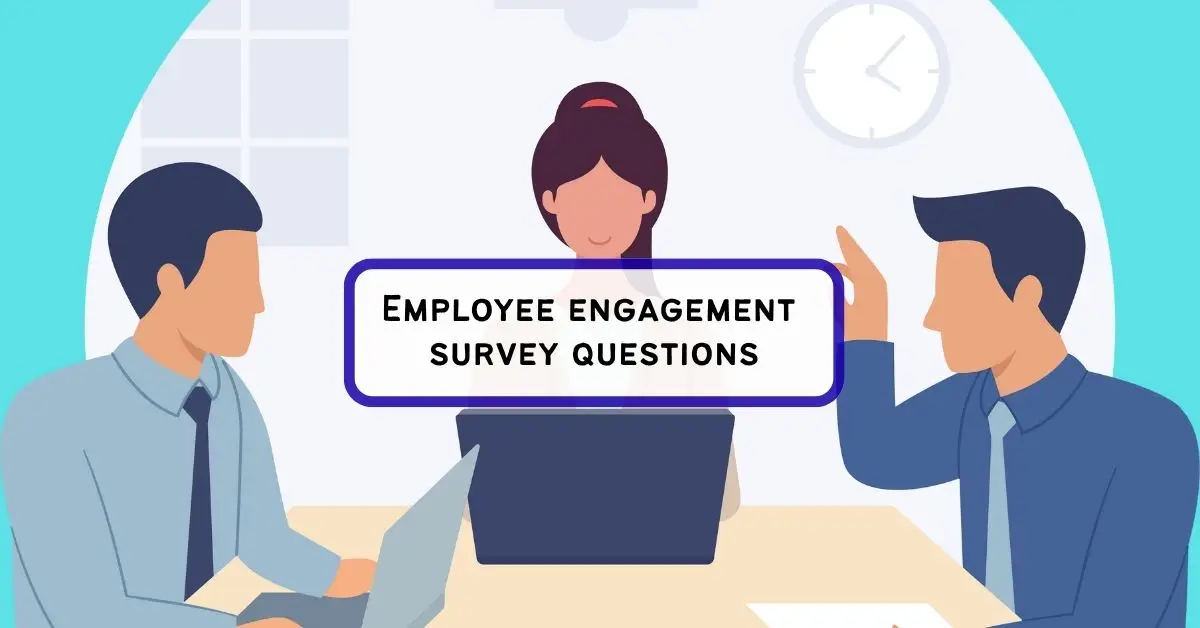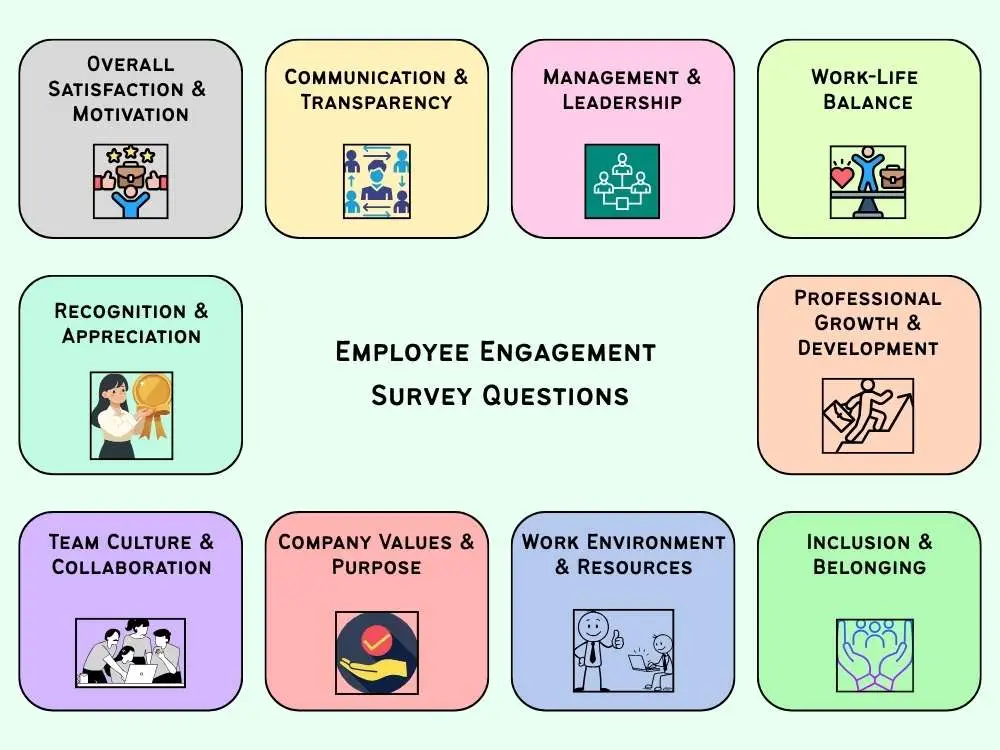
50 Employee Engagement Survey Questions That Drive Meaningful Insights
How well do you really know what's going on inside your team? Most leaders think that they know how their employees feel. However, they get surprised when people actually start talking. That's where employee engagement survey questions come in. They're one of the most powerful ways to understand how your employees really feel.
You don’t need sophisticated tools or costly advisers to obtain clear opinions. What you need is to ask the people the right questions that count. The type that makes people stop and think, rather than just tick the checkboxes without any thought.
Key Takeaways
- Understand why employee engagement surveys actually matter.
- Explore 50 employee engagement survey questions in 10 different categories.
- Learn how to design survey questions and ways to make survey results impactful.
- Know common mistakes to avoid and best tips to get better responses.
Why Employee Engagement Surveys Actually Matter
Surveys can feel like another corporate thing that collects dust in someone’s inbox. But when done right, they transform your culture. Wouldn’t you rather know your employees' frustration before finding out when they hand in their resignations?
Engagement surveys help you:
- Spot burnout before it hits hard.
- Understand motivation levels (or lack thereof).
- Identify toxic behaviors that might be affecting morale.
- Highlight leadership wins that deserve more of the spotlight.
Ever thought why some teams crush goals while others can’t even decide where to have lunch? Engagement data is usually the missing link.
The 50 Employee Engagement Survey Questions You Need

Below are 50 questions organized into categories so you can pick what fits your needs. Each one is designed to help you learn something important about your team.
A) Overall Satisfaction & Motivation
- Are you happy with your current job role?
- How excited are you coming to work each day?
- Does your job align with your career goals?
- Would you recommend our company as a better workplace?
- Do you see yourself working here a year from now?
B) Communication & Transparency
- Do you feel informed about company updates and where we're heading?
- Does leadership communicate clearly and honestly with you?
- How comfortable are you sharing feedback with your manager?
- Do you understand how decisions get made around here?
- Does leadership follow through on promises?
C) Management & Leadership
- Does your manager show genuine appreciation for your efforts?
- Do you get constructive feedback often?
- Does your manager support your career growth?
- How easy to approach your manager when issues arise?
- Do you trust your manager’s decisions?
D) Work-Life Balance
- Do you feel you have a healthy work-life balance?
- Can you take time off without feeling guilty?
- Do you feel supported when managing personal or family matters?
- How often do you feel stressed or overworked?
- Are you satisfied with the company’s flexibility on remote or hybrid work?
E) Recognition & Appreciation
- Do you think your contributions are properly valued?
- Do you receive recognition for doing your job well?
- Does your team celebrate small wins along the way?
- How often do you feel that feedback is genuine?
- Do recognition programs motivate you to do your best?
F) Professional Growth & Development
- Are there opportunities for you to learn something new?
- Does your manager have conversations with you about your career goals?
- Do you believe the company is invested in your professional development?
- Are you satisfied with the available training?
- Do you feel pushed to try new things?
G) Team Culture & Collaboration
- Do you really enjoy working with your teammates?
- Does your team collaborate effectively?
- Are team meetings productive or just a waste of coffee time?
- Do you feel comfortable sharing new ideas?
- Does your team handle conflicts constructively?
H) Company Values & Purpose
- Do you actually believe in the company’s mission?
- Do you feel proud to tell others where you work?
- Does the company’s culture align with its stated values?
- Do you feel the company genuinely cares about employees?
- Does your work contribute to something meaningful?
I) Work Environment & Resources
- Are the right tools and technology provided for you to perform your job excellently?
- Is your workspace comfortable and conducive to productivity?
- Does the company take care of its employees and make their safety a priority?
- How satisfied are you with the resources available for remote work?
- Do you think the company is good at adapting to new challenges?
J) Inclusion & Belonging
- Do you feel included and respected at the workplace?
- Does the company appreciate diversity among opinions and backgrounds?
- Can you be your true self at work without feeling uncomfortable?
- Have you seen or gone through any discrimination in this place?
- Do you think the management is backing an inclusive culture?
How to Design a Great Employee Engagement Survey
Let’s cover some quick ground rules. Because no matter how great your questions are, a poorly designed survey can sink faster than your motivation on a Monday morning.
- Keep It Anonymous: If people think their answers will be traced back to them, guess what? They’ll lie. Anonymity is important for honesty.
- Use a Mix of Question Types: You just need to balance rating scales, yes/no, and open-ended questions. That mix helps you keep things interesting and prevents survey fatigue.
- Ask, Then Act: This one’s big. You have to act relevantly for the answers provided by the employees. If you ask for feedback and fail to do anything about it, employees stop caring.
How to Make Your Survey Results Impactful
First, don't just sit there emptying your brain onto numbers as if you are trying to break the code to the matrix. Data can be useful if you take action properly. Here's what to do with your survey results to create impact:
- Look for Patterns: Look for trends in the comments. Are employees unhappy about communication? Overworked? Feeling unappreciated?
- Focus on the Big Things First: You can't do everything at once. Try to work on the top 2-3 problems that highly impact staff morale.
- Share the Results: You have to be transparent even with the negative data. That alone helps demonstrate your leadership and build trust. Employees respect honesty more than they respect perfection.
- Develop an Action Plan: Set goals and assign owners. Let people know where you are in the process. People want to see movement, not promises.
Common Mistakes to Avoid
Sometimes good intentions can also backfire. Let's see some common survey mistakes that you should avoid:
- Survey overload. If you run them too often, people stop caring.
- Ignoring feedback. Nothing damages trust faster than inaction.
- Avoid leading questions like “Do you love our amazing leadership?”
- Zero follow-up. Engagement tanks if you don’t communicate the next steps.
You have to remember that the goal isn’t to look good. It’s about getting better.
Tips to Get Better Responses
Surveys probably receive fewer responses than your company's newsletter. Let's see some ideas to do things differently:
- Make surveys short and sweet with no more than 10-15 minutes.
- Clearly explain your purpose of using the survey and how the results will be used.
- Make it mobile-friendly because people use phones most of the time.
- Offer a thank you for completing the survey, even if it's public appreciation. Your employees appreciate being recognized.
You'll be surprised by how engagement can increase when employees' input matters.
Wrapping Up
Employee engagement is vital for every organization. It has a direct influence over your staff's efficiency and your company's overall performance. Employee engagement is always reflected in their work output. These 50 employee engagement survey questions are an efficient way to assess your team. However, it's more than listening to the responses and acting accordingly that really matters.
FAQs
Q1: How often should I run employee engagement surveys?
Usually, quarterly surveys work perfectly for most firms. That is sufficient to detect trends without your team being constantly questioned and thus becoming overwhelmed. If you want faster feedback, then you may ask a few important questions every month. Don't conduct surveys on more areas than you have the resources to address the feedback.
Q2: Should employee engagement surveys be anonymous?
Yes, in most cases. People are more honest when they know their answers won't be tied back to them. Just make sure you actually tell people the survey is anonymous so they feel safe being honest.
.webp)